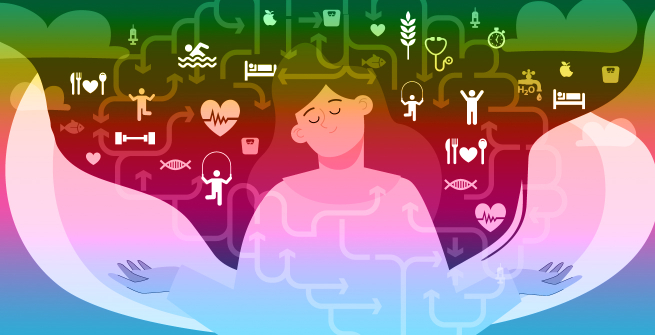Living a life that you enjoy can depend on many things. One major factor that contributes to the quality of life is your mental and physical health. When your overall health is in decline, all other aspects of your life suffer as well. We usually do not pay attention to our health until a serious chronic condition, like heart disease, diabetes, or cancer develops and demands all our time and attention.
The good news is that many of the most common chronic health conditions can be prevented. Lifestyle Medicine is emerging as one of the most effective medical fields that focuses on lifestyle changes that can be used as tools to prevent and manage serious diseases that can be fatal if they are not properly addressed. “The evolving field of Lifestyle Medicine addresses the simple health behaviors that are the root cause of more than 80% of chronic disease, premature death, and healthcare costs. While our medical care system provides episodic, reactive, sickness-based care, Lifestyle Medicine works to prevent, treat, and reverse chronic disease by helping individuals improve their food choices, get enough physical activity, strengthen relationships, get adequate rest, manage stress, and limit or eliminate toxic substances,” states Dr. Edward Phillips, associate professor at Harvard Medical School and Director of the Institute Lifestyle Medicine.
The Institute of Lifestyle Medicine was founded at Harvard Medical School in 2007 to provide this education through Continuing Medical Education (CME) and advocacy to spread Lifestyle Medicine education to all medical schools and health professions training programs. Establishing Lifestyle Medicine as the foundation of all clinical care requires that it be taught to all Health Professions Trainees as well as practicing clinicians. The ILM has reached over 25,000 clinicians from over 115 countries.
Dr. Phillips has dedicated his career to preventative care and has written a book, Food, We Need to Talk, and hosts a podcast to demystify Lifestyle Medicine and make it accessible to anyone who may benefit from the information. Dr. Phillips believes that Lifestyle Medicine awareness and education is important for the future of better healthcare and that “having public institutions, like the Los Angeles Public Library, provide this type of health education to the community is imperative to addressing the epidemic of preventable chronic diseases”.
For some, Lifestyle Medicine awareness and education is only part of the equation. Many members of the community face various barriers to improving their health and need programs and services that encourage and support healthy lifestyle changes. "The people in our communities experience many challenges that make it difficult to make constructive changes in their lives to improve their health. They need health education and specialized assistance that can help them reach their health and wellness goals", states Johana Davila, at Eastmont Community Center.
Davila, who is the Community Integrative Health Education and Services Program Director at Eastmont, collaborates with Dr. Desmonette Hazly to provide culturally inclusive and trauma-informed integrative Lifestyle and Mind-Body Medicine education and services, which include specialized programs for seniors and young mothers, at healthcare facilities, nonprofit organizations and private and public agencies throughout southern California. "Dr. Hazly's ability to modify the training she received from Harvard's Institute of Lifestyle Medicine allows us to meet the unique needs and challenges of the people we serve. This has made all the difference. Our clients can relate to the information and are able to make lifestyle changes with ease while they learn to take better care of themselves.”
Making lifestyle changes to improve your health may seem difficult but making small adjustments over time can have a great impact on your health and inspire you to make further changes as you see and feel the benefits of modifying some your daily lifestyle habits. Here are a few tips from Dr. Hazly to kickstart healthy lifestyle changes:
- Prioritize Taking Care of Yourself
- Tending to our own health and wellness is always last on our to-do-lists. If you do not make your own health a priority, no one else will either. You are worth your own time and effort, so give yourself the attention you deserve.
- Think of Physical Activity as Good Medicine
- Research has shown that exercising regularly can decrease the risk of developing chronic illness, prevent weight gain, decrease rates of depression, and improve the cognitive function of older adults. Whether it’s jogging or going dancing with friends, including daily physical exercise in your life can make you feel good inside and out.
- Make Time to Relax and Decompress
- Our lives can be very hectic, and it is easy to feel overwhelmed. Taking a few minutes each day to relax and unwind is important for our mental and physical health. We recharge our brains and our bodies when we can give ourselves some space to breathe and focus on something that makes us feel calm and centered. Taking a walk, meditating, quiet reading, or working on an art project are just a few ways to take a break and relax the body and mind.
- Focus on Eating Healthy Meals and Not on Dieting
- We are bombarded with many types of diets to lose weight. But when it comes to food, the true bottom line is being healthy. Making simple changes to the foods you eat can not only help maintain a healthy weight, but it can also prevent illnesses and support your mental health. Enjoying daily meals with more fruits and vegetables, modest servings of healthy proteins and fats, and less processed foods can help you lose those extra pounds, give you more energy and improve your overall health and well-being.





